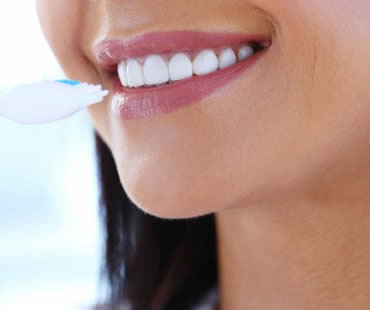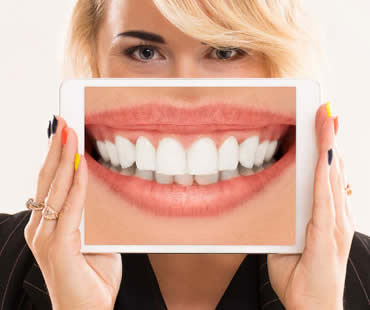
It can be difficult to avoid the signs of aging and lifestyle on your teeth. They can become stained or yellowed over the years, but they don’t have to remain that way. You might choose to have your smile professionally brightened at your dentist’s office, but you’ll want to maintain those pearly whites. Here are some tips you can follow at home to keep your smile bright and beautiful.
Eat crunchy foods.
Crunchy foods are often acidic, which means they naturally help clean your teeth. Examples include apples, pears, celery, and carrots. Crunchy foods are also more abrasive, so the cleaner your teeth will become as they are naturally scrubbed during chewing. The cleaning benefit comes with the crunch, so eat them in their whole form instead of cutting or crushing them up.
Consume dairy products.
Foods like milk, cheese, and yogurt contain minerals such as phosphorus and calcium. These mineral help strengthen your teeth and make them whiter. Your smile will be more appealing and healthier when you include dairy in your diet.
Don’t forget strawberries.
The malic acid in strawberries helps reduce tooth discolorations, and the rough texture of the fruit buffs your tooth enamel. This creates a smoother and brighter look. In addition to eating strawberries, you can also crush them to mix with a half teaspoon of baking soda and a bit of lemon juice. Apply this mixture onto your teeth for five minutes to improve their appearance.
Try baking soda.
As mentioned above, baking soda can help clean teeth if used in moderation. Rub a pinch of baking soda onto your teeth and then rinse it away, or mix it with hydrogen peroxide and salt to naturally brighten your smile.
Use a straw.
If you can’t eliminate dark beverages like wine or colas from your diet, drink them from a straw so that the liquid goes straight into your mouth instead of over your teeth.
Get an electric toothbrush.
Stubborn stains on tooth surfaces are often more responsive to cleaning with an electric toothbrush instead of a manual one.
We treat patients from Toronto and the surrounding area

Once you have had dental implants surgically placed, you will want to follow some important care tips to ensure their long-term success. With proper care, dental implants can last a lifetime, so it’s exceptionally important to adhere to the instructions provided by your dentist and guidelines like these:
- Follow a vigilant routine of brushing and flossing thoroughly at least twice per day to eliminate the plaque that can cause periodontal disease, which is a leading cause of implant failure.
-
- Consult with your dentist about the type and use of special toothbrushes or oral irrigation devices that can help with the additional removal of food debris or plaque that builds up around the implant areas.
-
- Visit your dentist approximately every three months for the first year after implant surgery, and then every six months for the duration of your implants.
-
- If you are also wearing an implant supported denture, seek additional guidance from your dentist about the placement and removal of your denture to prevent damage to the implant.
-
- Refrain from applying excessive pressure or chewing on hard foods that could cause damage to the implant area. Patients who suffer from bruxism (teeth grinding) should consider being fitted for a night guard to protect the implants.
While the success rate of dental implants is high, implant failure can happen and normally results from infection, fracture, or damage to the nerves, teeth or blood vessels surrounding the implant. A successful implant patient who takes vigilant care of their teeth, gums, and implants can expect a full recovery and complication-free lifetime of beautiful, healthy smiles.
If you need a dentist in Toronto contact us today

White teeth are a sign of beauty and health. Having pearly whites shows that you take pride in your appearance and gives you a confident air. There are many ways to achieve a brighter smile; here are some tips to help you get that shiny glow.
Professional whitening is a sure-fire way to brighten your smile by numerous shades. In only an hour, your smile can go from dull and dingy to white and polished. Your dental professional can guide you in the best ways to enhance your look with tools such as lasers or whitening trays. Professional methods are the quickest route to a dramatic improvement in the shade of your teeth.
If you prefer methods in your own home, drugstores have lots of options. Whitening strips, gels, and toothpastes are only a few of the choices available. These typically require consistent use for an extended period, but they can improve the color of your teeth with proper use. Follow the instructions carefully for the best results.
There are also natural ways to whiten your teeth at home. Rubbing your teeth with the back of a lemon or orange peel can help, and adding a little salt can make it even more effective. Strawberries may be directly rubbed onto your teeth, or made into a paste by mashing them up with a little water and then brushing onto your teeth for five minutes. Each of these methods should be followed by thorough rinsing of the mouth to eliminate residue or acids left behind.
Baking soda is a proven ingredient to help brighten your smile. Mixing baking soda and water to form a paste that can then be brushed onto your teeth is a great tip. Follow up by rinsing with water or hydrogen peroxide, and then brushing normally with toothpaste.
Consult your dentist to make sure you aren’t harming your teeth or mouth when you try any whitening methods yourself. If you experience pain, stop and ask your dentist for advice. Do not use over-the-counter or professional whitening methods during pregnancy without consulting your doctor first.
We treat patients from Toronto and the surrounding area

Some people take a bite of ice cream or a sip of hot coffee and experience discomfort, usually brought on by teeth sensitivity. These unpleasant sensations typically occur when you eat anything that is cold, hot, or sweet. Several factors can cause teeth sensitivity, including tooth damage, over brushing, enamel wear, and whitening products.
To give your mouth relief and lessen sensitivity, consider these helpful hints:
Brush correctly
In an effort to maintain good oral health, some people brush too aggressively and end up damaging their teeth. Choose a soft-bristled toothbrush and gently clean teeth at least twice a day.
Use the right product
For people with sensitive teeth, specially formulated toothpastes may reduce the symptoms. These products usually contain potassium nitrate, an ingredient that helps block the tiny tubules in the layer of dentin and reduces sensitivity with each use.
Watch your diet
Foods and beverages high in acid content, like tomatoes, oranges, and fruit drinks, contribute to enamel erosion, which is a main cause of tooth sensitivity. Limiting your intake will help lessen your discomfort. When you do consume these items, rinse your mouth with water afterward to minimize exposure.
Deal with bruxism
Clenching and grinding your teeth can make teeth sensitivity worse. Wearing a night guard will help control bruxism and help you feel better.
Be careful when you whiten
A bright smile is a great asset, but some people overuse whitening products, which can cause teeth to feel sensitive. Usually this sensation passes once you stop whitening. Make sure to follow all the directions carefully so that you don’t hurt your teeth.
If you live in the Toronto area contact us today

When your tooth pulp that is located in the center of each of your teeth becomes damaged or infected, the best way to save the tooth is to have root canal therapy. This safe and effective treatment is not as painful as its reputation, and should not be avoided. Watching for signs that your tooth pulp has been compromised is an important step in saving your tooth, so that treatment may be performed before your condition becomes too advanced.
There are not always signs associated with a tooth that requires root canal therapy. Sometimes only examination, X-rays, and other tests will reveal problems. This is one reason regular dental visits are important. In other cases, symptoms are present to indicate pulp damage. Some typical signs include:
- Pain that is often related to inflamed tooth pulp, which can be caused by deep decay, chipped or cracked teeth, repeated dental procedures, faulty crowns, infection, tooth grinding, or periodontitis. Inflammation increases pressure inside the pulp cavity and triggers the tooth’s nerves. The pain may be in the tooth itself, or it can be referred to other areas in your mouth. Pain when eating or sensitivity to hot or cold is also common.
- Gum swelling near the damaged tooth
- Facial swelling
- Tooth loosening
- Pus around the damaged tooth
- Tooth discoloration, which usually occurs over a longer period of time. Discoloration can take weeks, months, or years to appear. This is another reason for regular dental checkups.
If you experience any of the symptoms above, or if your dentist identifies problems upon examination, it’s time to consider root canal therapy. Saving your natural tooth is almost always better than having to replace a lost tooth. Root canal therapy can help you keep your smile intact, as well as its function. Your natural sensations of a real tooth remain, as well as normal biting abilities. Don’t shy away from treatment; take care of tooth pulp problems when they arise.
We treat patients from Toronto and the surrounding area

Lots of things can go wrong with your oral health if you aren’t aware of potential problems and how to avoid them. There are some simple ways that can help you maintain good oral health and steer clear of sometimes painful problems.
Cavities
Your first line of defense against cavities is good oral care, including regular and thorough brushing and flossing. Reducing your consumption of sugary and acidic foods and drinks will also help. Ask your dentist about fluoride treatments and dental sealants, both of which can provide extra protection against cavities. Quitting smoking is another good way to avoid problems, since the habit makes your teeth sticky and more prone to allowing bacteria to cling to your tooth enamel.
Gum disease
Practicing good oral hygiene is the best way to fight gum disease, also called gingivitis. Once you develop gingivitis, it can develop into the more serious periodontitis if you’re not careful. Brush at least twice daily with fluoride toothpaste and a soft toothbrush, which can be manual or powered. Floss every single day, and you may also rinse with an antiseptic mouthwash. Professional teeth cleanings and checkups twice a year, eating a balanced diet, and quitting smoking are also helpful in preventing gum disease.
TMJ
Temperomandibular joint disorder, or TMJ, is an increasingly common problem. It causes chronic jaw pain, popping, headaches, and neck problems. Teeth grinding or clenching are leading causes of TMJ, but it can also result from arthritis or trauma. If you suspect you are grinding or clenching your teeth, or are experiencing pain consistent with TMJ symptoms, visit your dentist. Some treatments include sleeping with a custom mouth guard, applying a warm washcloth to relax your jaw muscles, and practicing stress-reducing techniques like meditation.
If you need a dentist in Toronto contact us today







 E-Mail Us
E-Mail Us  416-595-5490
416-595-5490








